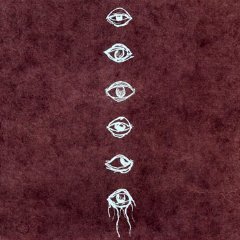Originally released in a limited fashion back in 2008, Secular Works is a remarkable and peculiar thing indeed. The hybrid offspring of Charlie Looker (Zs, Dirty Projectors, Zorn, etc.), Extra Life marries extremes of dense, abstract mathiness with medieval ecclesiastical melodies, ominous atmospherics and twisted explorations of aged folk traditions.
‘Blackmail Blues’ announces itself a heavy latterday Tool riff (no, really) rendered in violin and super-twangy bass, the sound of a dragon’s ligaments being plucked. Looker’s voice flits, agile and authoritative, like a be-jerkined troubadour, promising faithfully to heal personal rifts and rebuild allegiances. Around six minutes in, the song’s already tangled geometry begins to reach new levels of complexity, its rhythmic phrases mutating into myriad irregular permutations. The closing minute is wonderful – an intimidating and absurd exercise in scripted group minutiae that will make your brain boil and cascade from your earpipes.
‘I Don’t See it that Way’ exists at the exact midpoint between ultra-technical sensory overload and the warm embrace of lush, anthemic chamber pop. If not for the insane, fractured timings and soaring, sideways extrapolations of English pastoral song, it could almost be an innocuously pleasant portrayal of NYC archetypes.
Sombre, meditative and affecting, the epic ‘I’ll Burn’ sounds like a lost 16th-century monastic chorale. Though a beautiful piece in isolation, contrast is not this song’s friend. Following the barrage of ideas on the earlier tracks, it seems frustratingly static by comparison, and begins to drag. Similarly, the sparse, quietly doomy ‘This Time’ hangs in space for a good seven minutes before beginning re-entry as a plummeting hulk, all jerky rhythms and ensemble anguish.
The mad gallop o’er hill and dale of ‘The Refrain’ again visits medieval England for inspiration. This is music to feast to, music for mead-gluggers, music to roast several animals inside several other animals by. From beneath the suffocating drone-blanket of ‘See You at the Show’ emerges Looker, barely audible, rapidly flutter-muttering, accompanying his raga ranting note-for-note on guitar. Deeply unsettling, this is the sound of auditory hallucinations, of inexorable solipsistic madness – and eruptions of metallic sound suggest that this deterioration will end in violence. Yet ‘Secular Works’ concludes, as befits its scattering of devotional subtexts, with an a capella hymn, Looker’s more idiosyncratically tremulous extremes recalling a more approachable Antony Hegarty.
Wildly ambitious and utterly unique, Secular Works is a challenging but compulsive listen, as utterly incomprehensible as it is undeniably immediate. It offers an extraordinarily multi-faceted experience, perfectly pitched between welcoming, ancestrally familiar communal song and alienating, willfully abstruse constructions.


